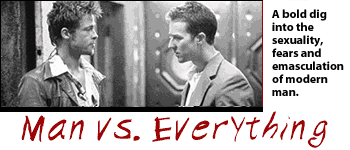|
| ||||||
| NOVEMBER 1999 | VOL. 3, NO. 11 FEATURES LAST MONTH
| 
TIM CLIFTON "Fight Club" is, by and large, an effective film that surrealistically describes the status of the American male at the end of the 20th century: disenchanted, unfulfilled, castrated and looking for a way out. At times equally exhilarating, insightful, funny and inscrutable, "Fight Club" has enough ideas for five films and story lines for three, pushing well beyond two hours in length and exhausting the audience's attention span in the process. In a season where many films have modest and predictable goals, "Fight Club" is a wild smorgasbord. The beginning of the film is pitch perfect, chronicling the desperation and despair of modern living in a society where comfort is the measure of success. It's the ultimate visual statement of the question: Are you working for your car or is your car working for you? A consumer society that emasculates men. No rite of passage into manhood, no lion or bear to kill. In an era where men do not have missions, in the urban wilderness, what is there to hunt? To dominate? To kill? To its credit, "Fight Club" has pace, it builds up to its violent scenes and at times offers an amusing and pathetic portrait of a nebbish loner, Edward Norton ("Primal Fear", "American History X"), unnamed at the beginning of the film, aside from the pseudonyms he uses as he trolls for emotional connection by attending every support group he can find. But for the most part he is sleepwalking through life, sad with dark circled eyes, thinking that his life will be complete once he buys all his IKEA furniture. He becomes a support group junkie because it's the only way he can relate and have contact with people, and discovers that his "power animal", in one hilarious visualization scene, is a penguin. By chance he meets Tyler Durden, played by Brad Pitt ("Legends of the Fall", "Seven"), who appears to have it all in the manhood department: he is, literally as we find out, everything that Edward Norton's character is not. He admires the freedom of Durden, a man's man, independent and self assured, who's not ashamed of his desires and wants. Durden doesn't own anything, and makes his living by raiding liposuction disposal units, his primary ingredient to make soap that he sells to upscale department stores, in other words, he is the urban equivalent of a hunter gatherer, using the system so that he can live by his own rules. Durden makes you think that he's just a couple of negative life experiences away from the serial killer Pitt played in "Kalifornia." Together, they establish a fight club for men, as an underground way to express rage and live on the edge, to feel alive by approaching death. Durden beds Marla Singer (Helena Bonham Carter), a woman Norton accosted in his exploratory support group encounters. And this is where we get the first hint that Durden is pure, undiluted id unbound, and sets up what we eventually discover: that both Pitt and Norton are Tyler Durden, the intellect and the id fractionated, dissociated from each other. The fact that they live in a decaying house but in different rooms is symbolic of that separation. This film, bottom line, turns out to be a primer in Sigmund Freud and Robert Bly with a touch of Jung added in. While this is a cunning twist, (on par with the surprise twist in "The Sixth Sense"), unfortunately it makes the last quarter of the film difficult going, as it loses its momentum, particularly as the story departs on a fascist plot line designed to wreak larger havoc on society in order to bring about collapse. Fincher has a strong visual and mood setting style that cumulatively builds suspense. He is no stranger to the dark nature of mankind as evidenced in the film "Seven". Fincher works in the nether regions of the color spectrum preferring blacks, grays and other muted colors. "Fight Club" also plays with perspective effectively, using sound and visual effects, as well as simple devices such as having characters break the fourth wall by talking directly to the audience. This is like an underground film that accidentally got greenlighted with a $60 million budget. One may be tempted to have a knee jerk reaction that the violence and fascist tone in "Fight Club" lands it in the odious company of "Natural Born Killers", but this film is much smarter and deeper than that. The violence in "Fight Club" is honest and ugly. It's not a ballet like Sam Peckinpaw ("The Wild Bunch") or a comedic choreography like Stanley Kubrick's "A Clockwork Orange". "Fight Club" is about a man trying to become an integrated and whole human being, searching for identity, a place, a mission in a consumer world where our last major war was over petroleum. "Fight Club" is anchored in the performance of its two stars and intelligently written with sharp observations about American society. Norton carries the first part of the film masterfully. As for Brad Pitt, it deconstructs his matinee idol status and makes him a truly menacing figure. This is arguably the most audacious mainstream movie to be released this year. And even though it's outrageous and out of control, and runs out of gas before the end, it's because this film is trying to push the envelope and every button in sight at the same time. TIM CLIFTON is Renaissance Online Magazine's staff movie reviewer. | |||||
|
| ||||||
 | ARTS | Movies | The Tube | Music | Books | |||||
| Full Issue Contents | FEEDBACK | Questionnaire | Archive | Free Subscription | ||||||




